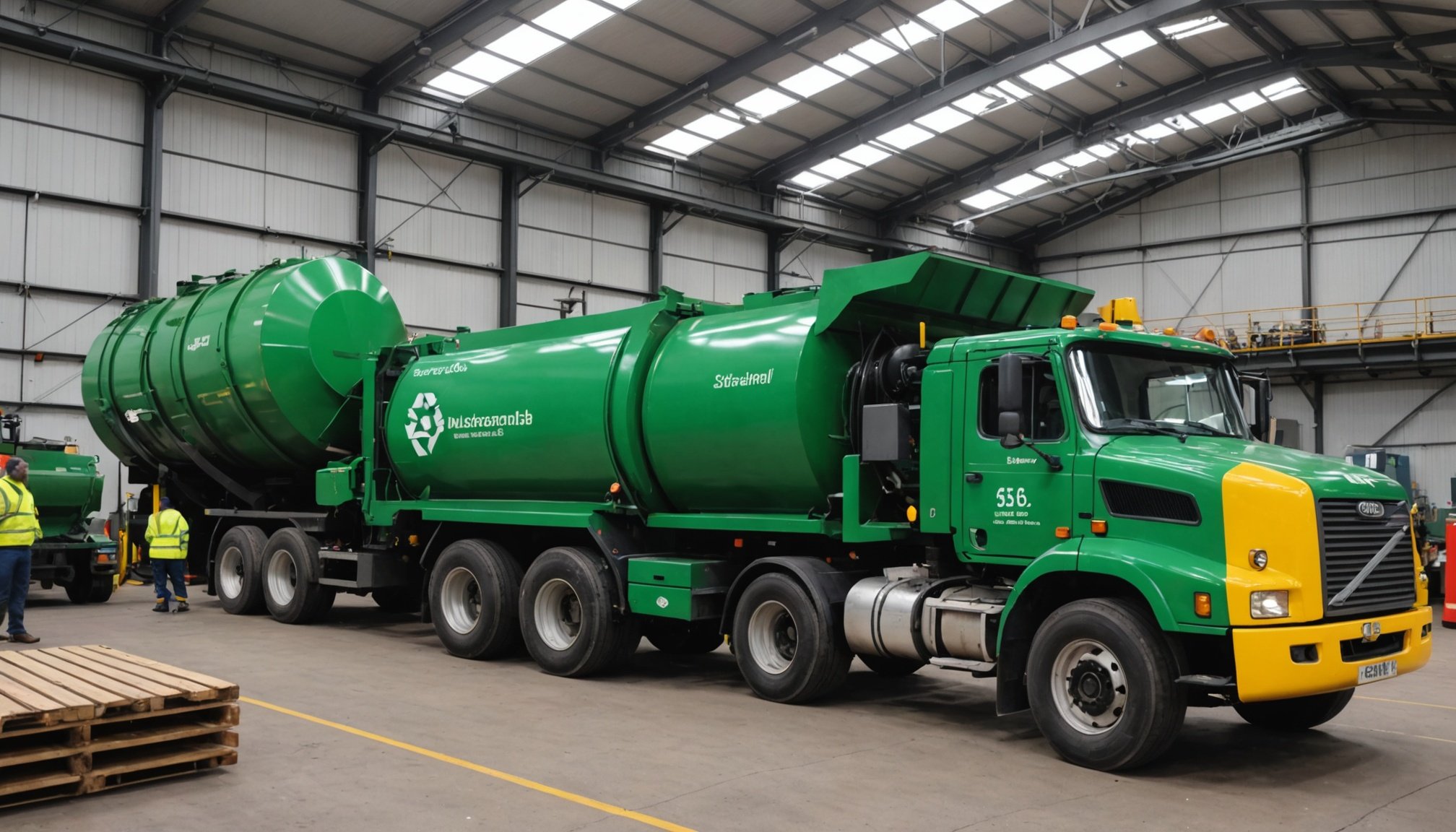Overview of Sustainable Waste Management in UK Manufacturing
Sustainable waste management refers to effectively handling waste products in manufacturing with minimal adverse environmental impact. It is crucial in UK manufacturing to reduce waste and enhance resource efficiency. As manufacturers face increasing pressure from regulations and consumer demands for sustainability, the importance of this practice becomes apparent.
UK manufacturers encounter several waste management challenges, such as high levels of waste production and the need for more innovative recycling technologies. Implementing sustainable waste management can be daunting due to the complexity of waste streams and the need for substantial investment in new technologies.
This might interest you : Key considerations for uk companies to assess before integrating ai in customer service
Despite these challenges, the benefits are substantial. Sustainable waste management practices can lead to reduced operational costs and enhanced brand image. UK manufacturers can also experience improved compliance with environmental regulations and foster a competitive edge in global markets by reducing their environmental impact. Additionally, sustainable practices allow for more efficient resource use, aligning with the global shift towards a circular economy.
Understanding the critical role of sustainable waste management is essential for manufacturers aiming to thrive in the future. Implementing these practices not only addresses environmental concerns but also bolsters business sustainability.
Also to see : Eco-conscious food packaging: your comprehensive guide to sustainable solutions in the uk
Strategies for Waste Reduction in Manufacturing Facilities
In today’s competitive landscape, waste reduction techniques play a crucial role in enhancing operational efficiency. Lean manufacturing principles are integral to this pursuit. They focus on streamlining processes, reducing waste, and maximizing value. By adopting these principles, factories can cut excess expenses while maintaining or even improving output quality.
Minimizing waste at the source is another key strategy. This involves pinpointing inefficiencies in processes and equipment usage. For example, using precise measurements and timing can drastically cut material waste. Additionally, maintaining machinery properly can prevent resource-intensive breakdowns and delays.
Employee training is equally vital. Well-informed staff are equipped to identify waste reduction opportunities on the factory floor. Comprehensive training programs foster a culture of continuous improvement, ensuring that all personnel are engaged in waste reduction initiatives. This proactive approach not only enhances efficiency but also boosts morale, as employees see their contributions leading to tangible improvements.
Incorporating these strategies ensures that manufacturing facilities not only meet but exceed industry standards for operational efficiency. The blend of lean principles, source minimization, and competent workers is the recipe for achieving sustainable success.
Recycling Methods and Innovations
Exploring the landscape of recycling methods reveals a blend of traditional techniques and cutting-edge innovations aimed at fostering a circular economy. The essence of recycling is to enable resource recovery, reducing waste and extending the lifecycle of materials.
Traditional Recycling Techniques
Traditional recycling methods are the backbone of the circular economy, providing a basic framework for resource recovery. These techniques typically involve sorting, cleaning, and reprocessing materials like paper, glass, and metals. Yet, they are limited by the quality degradation of recovered materials and can be energy-intensive.
Innovative Recycling Technologies
Emerging technologies are revolutionising the recycling industry by improving efficiency and output quality. Innovations such as chemical recycling, which breaks down polymers into their basic monomers, allow for infinite recycling loops without quality loss. Additionally, advancements in machine learning are enhancing automated sorting systems, reducing contamination rates and increasing the volume of recyclable materials.
Case Studies of Successful Recycling Implementations
Many UK manufacturers exemplify successful recycling implementations, contributing significantly to the circular economy. For instance, companies in the automotive and packaging sectors have integrated closed-loop systems, effectively recovering and reusing materials. This shift not only aids in resource recovery but also underlines the importance of innovation in achieving sustainability goals.
Regulatory Frameworks and Compliance in the UK
Navigating regulatory compliance in the UK requires a keen understanding of key legislation. At the forefront are the UK waste regulations, which set precise standards for waste management practices. These regulations aim to minimise the environmental impact and promote sustainable development in industries.
Compliance with these laws is crucial for manufacturers. They must adopt strategies tailored to UK waste regulations. Implementing robust waste management systems, conducting regular audits, and training staff are effective ways to achieve this. Moreover, collaboration with environmental consultants can ensure adherence to the intricate details of these rules, thus preventing potential legal pitfalls.
Staying informed on environmental legislation changes is vital. Regulatory frameworks frequently evolve, influenced by new scientific insights and public policy shifts. This requires companies to consistently engage in active monitoring and update their practices accordingly. Failure to keep abreast of these developments not only risks non-compliance but could also affect a company’s reputation and economic standing.
Manufacturers’ proactive approach not only secures compliance but also reflects an organisational commitment to responsible environmental stewardship, reinforcing their role as industry leaders. This adaptive strategy enhances reputation and sustainability.
Integrating Sustainability into Manufacturing Operations
Sustainable operations are crucial for the evolution of the manufacturing industry, particularly when focusing on environmental management systems (EMS). To develop an effective EMS, organisations should follow a structured process. First, assess the environmental impacts of your operations. This involves identifying sources of waste and resource consumption. Next, set measurable objectives to mitigate such impacts. Implementing an EMS requires regular monitoring and evaluation to ensure compliance with environmental goals.
Engaging stakeholders in sustainability efforts is pivotal. Organisations must foster open dialogues, encouraging employees, suppliers, and community members to contribute ideas and feedback. This not only enhances the effectiveness of the EMS but also builds a culture of shared responsibility towards sustainability.
Best practices for integrating sustainability into daily operations include adopting energy-efficient technologies and optimising supply chains. For instance, transitioning to renewable energy sources can significantly reduce a company’s carbon footprint. Additionally, implementing recycling and waste reduction strategies can lead to reduced environmental impact and cost savings. By embedding these practices into their routine, manufacturers can ensure that sustainability becomes an integral part of their operation rather than an afterthought.
Tools and Resources for Assessing and Implementing Waste Management Solutions
In this section, we explore how waste management tools, tailored assessment resources, and effective implementation guides can transform landfill strategies.
Assessment Tools for Waste Management
For comprehensive waste management assessment, use tools designed to evaluate practices accurately. These tools analyse waste streams, track volumes, and identify inefficiencies. Technologies such as LCA (Life Cycle Assessment) offer a detailed examination of a product’s environmental impact. They help in recognising areas of improvement and sustainable practices.
Resources for Best Practices
Access to robust resources is crucial for implementing efficient waste management. Many organizations and manufacturers require resources to understand industry best practices. A wealth of assessment resources is available online, providing insights into successful waste management strategies. From recycling protocols to landfill diversion methods, these resources support informed decision-making.
Implementation Guides
Step-by-step implementation guides simplify adopting new waste management solutions. Typically, these guides include actionable steps like stakeholder communication, technology milestones, and deployment schedules. They ensure processes are followed properly and offer solutions to common obstacles. With these guides, organizations can transition smoothly from planning to executing sustainable waste strategies. These resources facilitate efficiency and innovation in waste management.
Case Studies: Innovative Approaches in UK Manufacturing
Let’s explore case studies that highlight best practices in UK manufacturing, particularly in sustainable waste management. Several UK manufacturing facilities have successfully implemented waste reduction strategies, offering valuable success stories for the industry.
One remarkable example is a leading automotive plant that reduced waste by 70% within three years. By focusing on efficient materials usage and recycling, they set an industry benchmark. Implementing strict waste audits and employee training were key aspects that drove this success. These steps not only curtailed waste but also encouraged a culture of sustainability.
Another success story comes from an electronics manufacturer recognized for achieving zero landfill waste. They adopted a closed-loop manufacturing process, where by-products are reclaimed and reused, minimizing environmental impact. Regular equipment maintenance also played a crucial role in maintaining efficiency.
Key learnings from these case studies indicate that integrating sustainable practices into the manufacturing process can significantly reduce waste. Transferable strategies such as employee engagement, process audits, and investment in eco-friendly technology are essential. The potential impact on industry norms is profound, influencing broader adoption of environmentally conscious practices across the sector.
Environmental and Economic Benefits of Sustainable Practices
Implementing sustainable practices provides significant environmental benefits. A major aspect is sustainable waste management, which entails reducing waste and recycling materials efficiently. This reduces pollution and conserves natural resources, leading to a healthier environment. For example, recycling helps minimise the need for raw material extraction, which lowers carbon emissions and reduces energy consumption.
From an economic standpoint, there are numerous economic benefits for manufacturers who embrace sustainability. By reducing waste and energy usage, companies can decrease operational costs. Innovations in sustainable technology often lead to more efficient production processes, resulting in cost savings. Furthermore, adopting sustainable practices can enhance a brand’s reputation, providing a competitive advantage in the marketplace.
Sustainability outcomes extend beyond immediate gains for businesses and significantly impact society. As industries lean towards sustainable models, they contribute to long-term benefits such as job creation in green sectors and the potential for stable economic growth. The collective transition towards more sustainable practices can ensure natural resources are preserved for future generations, striking a balance between economic development and environmental protection.











